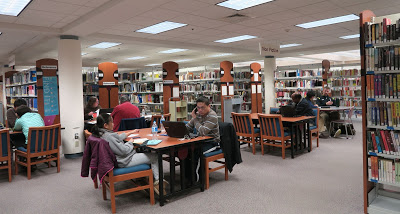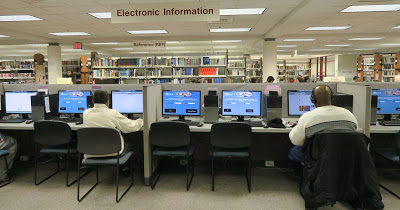Public engagement process underway on future of libraries
 |
| The George Mason Regional Library is busy on a Saturday morning. |
Several people at a community forum on the Fairfax County Public Library (FCPL) system March 19 recommended revising the policy on discarding old books, which is leading to a diminished collection as many still-useful books are being thrown out.
Under the library’s discard policy, books are discarded if not checked out within the previous 24 months. That is having an especially negative impact on math, engineering, and other technical books. Those materials might not be taken home that much, but are used in the library for research, library patrons say.
According to Nancy Davis, one of the facilitators of the forum, there is a standard protocol that calls for three librarians to approve a book for the discard pile. She called it “professionally irresponsible” to keep certain books with outdated information on medicine or geography, for example.
Librarians often don’t understand whether technical books are still relevant, one member of the audience countered. Math formulas, don’t change, for example.
The Fairfax Federation of Citizens Associations passed a resolution March 17 urging the Library Board of Trustees and Board of Supervisors to drop the 24-month low-demand review policy in favor of a 60-month review period and allow staff and volunteers to mend lightly damaged books.
According to a January 2016 FCPL document, 165,000 books were discarded during the previous six months.
The discard policy was just one of many issues raised at the community forum, which was convened to gather public input on potential new library services.
Several people raised concerns about repeated cuts to the library budget, which is less than 1 percent of the county budget, and the possibility that FCPL might de-emphasize printed books in favor of electronic media and cut shelf space to make more room for educational programs and meetings.
The March 19 meeting, at George Mason Regional Library in Annandale, was the first of three community forums on the future of the libraries mandated by the BoS as part of a public engagement initiative being carried out by consultants Marc Futterman, president of CivicTechnologies, and Nancy Davis, a partner with the Ivy Group. Future forums will be held at the Chantilly Regional Library April 12 at 7 p.m. and the Kings Park Library April 14 at 7:30 p.m.
The community outreach will also include a phone survey; interviews with library friends groups; meetings with stakeholders, including leaders of civic, arts, and business groups; and focus groups with specific audiences, such as people with special needs, seniors, and parents. An online survey is planned, too.
The consultants will compile the results and present an “opportunity analysis” to the library trustees and BoS summarizing public opinion, Futterman said, and might be asked to follow up with a strategic plan.
The consultants are not making budget recommendations, although whatever comes out of their analysis could have an impact on how library dollars are spent. “We are only looking at the possibility of future services based on public input,” Futterman said.
The meeting at George Mason was poorly attended – only about 10 people were there – but lots of suggestions were offered.
 |
| Library computers are critical for people who don’t have internet access at home. |
Davis started the discussion by asking “what do you love about the library?” Here are some of the responses:
- It’s all about the books; libraries are a place to read and to find answers.
- The staff is helpful.
- Parents of young children like the storytellers.
- Computer access is important, especially for people looking for a job.
- The summer reading program.
- English-as-a-second language instruction.
- Conversations happen at the library that don’t happen anywhere else.
- Special programs, like open house sessions, with crafts for children.
- It’s a safe place for kids after school.
- The intergenerational aspect of having a place to bring grandchildren.
- A quiet place to do homework, especially when children live in a noisy, crowded apartment.
- A place for teens to do group projects for school and meet with a tutor.
When asked about what the library doesn’t do very well, there were comments about how the budget cuts led to insufficient staffing.
A recommendation was made that FCPL follow Arlington’s lead in having librarians with expertise in certain areas, such as starting a business or career development, and who could provide more comprehensive advice to library patrons.
This is a big trend among libraries across the country, Futterman noted, but it requires libraries with limited budgets to make hard choices. Another option is to have library advisory boards with volunteers, usually retirees, that can offer expert advice on certain topics, he said.
Among other things shortcomings cited by the audience:
- Events aren’t publicized well enough.
- The FCPL website is not user friendly, and communication to the public is terrible.
- Library outreach should be translated into other languages.
- The library should be open eight hours on Sundays, because that’s when families like to come and students need to work on school assignments. (Currently libraries are only open 1-5 p.m. on Sundays.)
- The policy on “floating” the collection is not effective, and books end up in the wrong libraries. (This policy allows people to return a book to any library, rather than the one where they checked it out.) As an example of how this policy is not working, books in Korean that are supposed to be concentrated at George Mason are now dispersed all over the county.
Davis then posed this question to the audience: “How should the library balance the investment in technology versus other materials?” One member of the audience urged FCPL not to reduce the college of printed books by shifting the balance toward more e-books. Someone else noted internet access is critical, especially for people looking for a job. Another person spoke about how the library has databases that individuals can’t afford, but people don’t know what’s available or how to access them.
Davis asked what new services the public might want in the future, citing as an example, “maker spaces” with 3D printers and other technology for group projects.
A library should be a quiet place, one member of the audience said, and group activities might be more appropriate in a community center or after hours at a school.
Other new ideas suggested by audience members include:
- Story time for children in different languages.
- More adult programs during daytime hours.
- STEM (science, technology, engineering, and math) programs for girls.
- Raise revenue by charging for meeting room rental or establishing a membership fee.
- More innovative approaches to programming; the summer reading program is good but only 30 to 50 children can attend because of space limitations.
- More programs for people in the military and veterans.


These so called recommendations merely reflect the efforts of a few people to micromanage the libraries to meet their own particular needs. It should be obvious that letting books gather dust for 60 months is pointless. So is the notion that paper books won't inevitably be replaced by electronic books. Story time may be entertaining, but it's an obvious frill. Although the library budget may take up a small portion of the county's budget, that's still a lot of money being spent on a service that few county residents ever use. Most people have internet access and and the kids have access to school libraries. When seen in the appropriate context, it's clear that the funds being spent on libraries are proportional to their use.
Anon 11:58 – it may appear so, however given the low turnout at the meeting, it is inevitable that the sample size may not reflect the larger community's interests. Two suggestions:
1. Let's commend the people who took time to participate in this forum
2. Let's participate the upcoming sessions in order to diversify the recommendations pool.
Look forward to seeing you there; maybe we will end up recommending the same thing! 🙂
> Books that haven't been checked out in 60 months should be thrown out
> Paper books should disappear in favor of ebooks
> Group storytime is a frill
I'm glad you're not in charge of the library!
As for paper books "inevitably" being replaced by electronic, this ecosystem is evolving. Paper & ebooks will coexist for many years to come because of availability, economics, distribution systems, and user preference. We do have elevators, escalators, and stairs all in the same buildings sometimes.
Story time is extremely valuable for enhancing children's early literacy skills. It helps train caregivers to develop those skills so kids will be ready for kindergarten. Lots of reading at http://www.earlylit.net/early-literacy-research/
Finally, a significant number of residents do not have Internet access, or only have access on their phones. It's hard to do your homework or apply for a job on your phone.
Wow, 11:58! You sure are quick to completely dismiss a lot of people and things–and I bet you don't look back at all!
I don't have enough time to fill all the gaps in your reasoning, so I will simply cut to the chase: you don't know as much as you think you do.
Have you seen the cuts made to school libraries recently? And do "most people" have reliable access to the internet elsewhere? Be careful what you wish for…there is nothing else out there to replace the longstanding American institution of free public library access for everyone.
Hey 6:29 – libraries are free? And there I had this strange idea in my head that the taxpayers paid for it all….
Thanks for taking the time to report on this. Some small errors:
"Under the library’s discard policy, books are discarded if not checked out within the previous 24 months."
They are *reviewed* at 24 months. They may be kept, sent to other branches, offered to Friends groups for sale or discarded.
"That is having an especially negative impact on math, engineering, and other technical books."
Engineering and technical books become outdated quickly. Codes, standards, operating systems, etc. change.
"The Fairfax Federation of Citizens Associations passed a resolution March 17 urging the Library Board of Trustees and Board of Supervisors to …allow staff and volunteers to mend lightly damaged books."
We already mend lightly and not-so-lightly damaged books. We go through A LOT of tape.
Again, appreciation to the library and the public input process is appreciated.